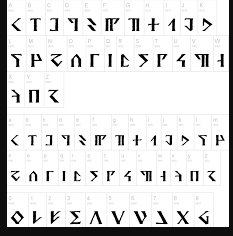Dwarvish or Dwarven was the name for a family of languages utilized by dwarves. The dwarves called their own language Dethek, But most other races used that term to ask the runic alphabet during which the language was written. Although a verbally dying language by 1400 DR [citation needed], Dwarvish was still found everywhere Faerûn inscribed into weapons, buildings, and mystical items.
The language followed dwarves everywhere Faerûn and beyond, making it a particularly widespread language. Communities and races that had been separated for a few time evolved their own dialects. Although once a robust and exclusive language, actual Dwarvish words only structure a fraction of the words employed by dwarves today. Many dwarves tend to talk commonly suffering from Dwarvish words. Dwarven record-keepers and historians are among the few left that would speak whole verses in pure Dwarvish.

Being such an old language, Dwarvish has been subject to varied changes over the generations and has spawned numerous dialects. All of those dialects employ Dethek as their written alphabet.
Dwarf Features
- Ability Score Increase – Your Constitution score increases by 2.
- Age – Dwarves mature at an equivalent rate as humans, but they’re considered young until they reach the age of fifty. On average, they live for about 350 years.
- Alignment – Most dwarves are lawful, believing firmly within the benefits of a well-ordered society. They have a tendency toward good also, with a robust sense of fair play and a belief that everybody deserves to share within the benefits of a just order.
- Size – Dwarves stand between 4 and 5 feet tall and average about 150 pounds. Your size is Medium.
- Speed – Your base walking speed is 25 feet. Your speed isn’t reduced by wearing heavy armor.
- Darkvision – Familiar with life underground, you’ve got a superior vision in dark and dim conditions. You’ll see in dim Inner Light 60 feet of you as if it were bright light, and darkly as if it were dim light. you cannot discern color darkness, only reminder gray.
- Dwarven Resilience – You’ve got the advantage on saving throws against poison, and you’ve got resistance against poison damage.
- Dwarven Combat Training – You’ve got proficiency with the battleax, handaxe, light hammer, and Warhammer.
- Tool Proficiency – You gain proficiency with the artisan’s tools of your choice: smith’s tools, brewer’s supplies, or mason’s tools.
- Stonecunning – Whenever you create an Intelligence (History) check associated with the origin of stonework, you’re considered proficient within the History skill and add double your proficiency bonus to the check, rather than your normal proficiency bonus.
- Languages – You’ll speak, read, and write Common and Dwarvish. Dwarvish is filled with hard consonants and guttural sounds, and people’s characteristics spill over into whatever other language a dwarf might speak.
When you reach 3rd level, you’ll cast the Enlarge/Reduce spell on yourself once with this trait, using only the spells enlarge option. Once you reach the 5th level, you’ll cast the Invisibility spell on yourself once with this trait. You do not need material components for either spell, or you cannot cast them while you’re in direct sunlight, although sunlight has no effect on them once cast. You regain the power to cast these spells with this trait once you finish an extended rest. Intelligence is your spellcasting ability for these spells.